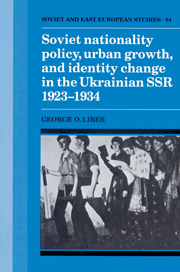Book contents
- Frontmatter
- Contents
- List of tables
- Acknowledgments
- Abbreviations
- A note on transliteration
- Maps
- Introduction
- Part I Periphery and center
- Part II Social changes
- Part III Political consequences
- Part IV Center's reaction
- 8 Shifting the anchors of legitimacy
- 9 Scorching the harvest, 1930–1934
- Conclusion
- Appendices
- Notes
- Bibliography
- Index
- Soviet and East European Studies
8 - Shifting the anchors of legitimacy
Published online by Cambridge University Press: 03 February 2010
- Frontmatter
- Contents
- List of tables
- Acknowledgments
- Abbreviations
- A note on transliteration
- Maps
- Introduction
- Part I Periphery and center
- Part II Social changes
- Part III Political consequences
- Part IV Center's reaction
- 8 Shifting the anchors of legitimacy
- 9 Scorching the harvest, 1930–1934
- Conclusion
- Appendices
- Notes
- Bibliography
- Index
- Soviet and East European Studies
Summary
By the end of the 1920s, a series of external and internal crises forced the Soviet leadership to reassess its claims of legitimacy within the multi-national state. Externally, the rise of fascism in Italy and Germany, Polish General Josef Pilsudski's coup d'état in May 1926, the Kuomintang's rupture of their alliance with the Soviet Union and persecution of Chinese communists in April 1927, Great Britain's severance of relations with the Soviet Union and cancellation of the Anglo-Soviet trade agreement in May 1927, the subsequent war scare, and the surge of the German National Social Democratic Workers' Party reinforced the Soviet Union's diplomatic isolation and contributed to its nightmare of capitalist encirclement. However exaggerated, the threat of recently empowered external enemies invading or intervening in the first socialist state was real.
Just as the Soviet leaders lost their external post-revolutionary diplomatic gains, they also lost control over urban food supplies within the country. In the early 1920s the Communist Party and the Soviet government had not provided the necessary incentives for the New Economic Policy to succeed, and by the late 1920s the cities, having attracted millions of new residents, encountered difficulties in supplying them with basic necessities. The economic exchange between the cities and the countryside broke down. Because the cities did not produce the necessary farm machinery or consumer goods, the countryside began to hoard its surplus grain, hoping for a “new deal” during the industrialization drive, which concentrated on heavy industry. As a result, Moscow, Leningrad, and other large cities experienced a severe shortage of basic foods.
- Type
- Chapter
- Information
- Soviet Nationality Policy, Urban Growth, and Identity Change in the Ukrainian SSR 1923–1934 , pp. 145 - 159Publisher: Cambridge University PressPrint publication year: 1992



